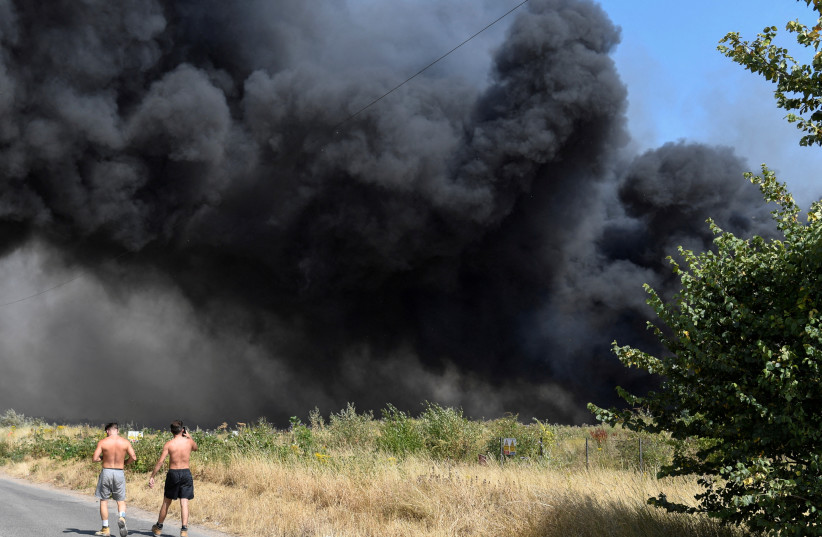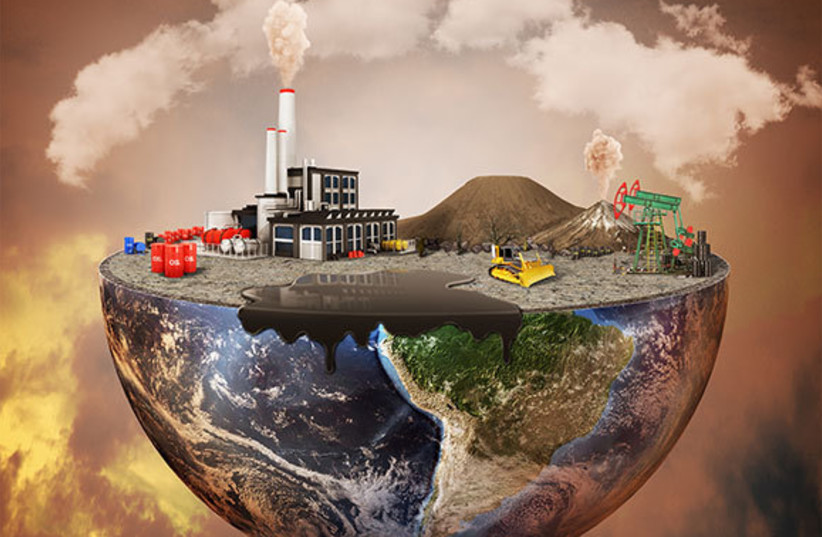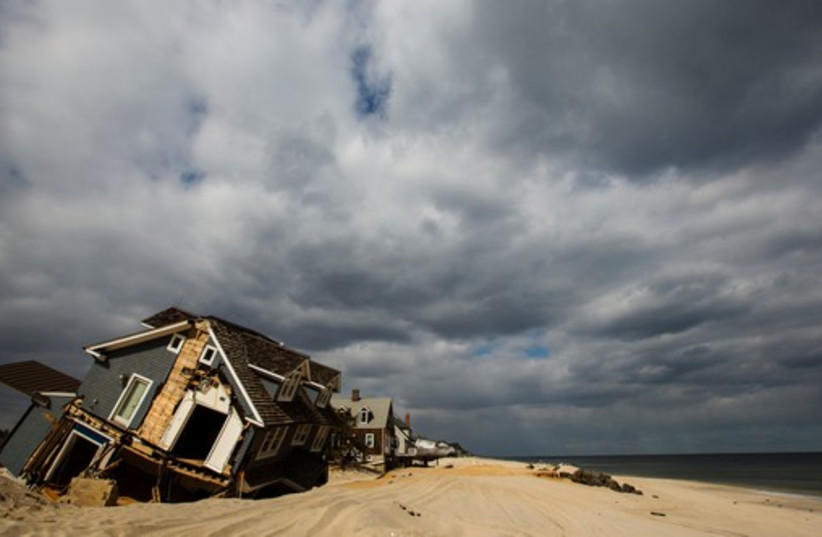The United Kingdom and large swaths of Europe are in the midst of an unprecedentedly severe heatwave.
While temperatures always tend to climb this time of year in the northern hemisphere's summer months, the current heatwave is far from normal, with many places seeing some of the hottest temperatures on record.
But is climate change responsible for the UK heatwave?
Yes, absolutely. And at this rate, it may only get worse in the coming years.
Here is everything you need to know.

What is the UK heatwave?
The current heatwave is a massive spike in temperatures to an almost unbearable extent, with the traditionally temperate British Isles now baking at a heat far outside the norm.
It should be noted that while most heavily associated with the UK, the heatwave is not solely exclusive to the British, and has been felt by several other European nations.
To describe the ongoing heatwave as "unbearable" is no exaggeration. Rather, what is often used as hyperbole is now the aptest description of the sheer level of debilitation experienced by the UK as a result of the heatwave, which recently saw temperatures hit 40.2° Celsius, the hottest temperature ever recorded in the British Isles.
This is, in part, due to the UK being traditionally a temperate country and much of the infrastructure has been built around this.
For example, compare the UK with the US. Many states are also experiencing a heat wave at this time, with temperatures set to climb to over 43° Celsius (110 degrees Fahrenheit), CNN reported.
But the US has a different culture. Air conditioners are widespread and are usually turned on when it begins getting mildly hot. Many parts of the US, especially states like Arizona where severe heatwaves are far more frequent, even have some measures and traditions to cope.
Other countries don't necessarily have this many issues either. The Middle East, Australia and other places often have severe temperature spikes as well.
Not so in the UK, however. And this has made many aspects of life in the UK to be significantly debilitated.
For example, take the trains. While many Britons would often use the train to commute, the British railway regulator has urged people not to use the trains, as the extreme heat has actually caused significant damage to the railway infrastructure nationwide.
Another example can be seen with Luton Airport, a major international airport serving London. Despite the summer being a common time for people to go on vacation, flights all ground to a halt after parts of the runway tarmac literally ended up melting due to the heat.
Notably, as observed by British scientists observing the heatwave from space thanks to satellites from the European Space Agency (ESA), the hottest areas tend to be London and other cities. These are generated by high concentrations of concrete, buildings and dense materials that retain heat more effectively than the Earth's surface does naturally.
The severe heat and commuting issues has caused many in the UK to stay home and work remotely, but this is not ideal for many Britons. Being the UK, a country that usually deals with severe cold in the winter, homes are often designed to keep heat in rather than let it out. Further, not everyone has proper cooling systems at home - which is why so many people ended up going to public spaces that do have them.
All of this is without mentioning the severe spate of fires that broke out both in parts of Europe and throughout London that pushed the firefighters to their limits.

And this is still without mentioning the heavy death toll in the UK and Europe from either the heat itself or a number of other causes like fires, drowning and more.
"While we can now thank supercomputers for predicting weather trends with remarkable accuracy, assisting Britain’s weather forecasters to relay what was coming our way, some infrastructure struggled badly to cope."
Ori Lewis
<br>This heatwave couldn't have been worse, right?
Actually, it could have been much worse.
UK outgoing Prime Minister Boris Johnson has been heavily criticized as of late for a number of things, poor heat management being one of them.
But while these criticisms are far from without merit, preexisting systems in place in the UK were able to see some of this coming and make some manner of preparations. Though still, it couldn't help everything.
As noted by The Jerusalem Post's Ori Lewis in London, "While we can now thank supercomputers for predicting weather trends with remarkable accuracy, assisting Britain’s weather forecasters to relay what was coming our way, some infrastructure struggled badly to cope."
"40 degrees Celsius in the UK is not an act of God, but to a large degree due to our past and present burning of fossil fuels."
Friederike Otto
Did climate change cause the heatwave?
The long answer is yes, but the short answer is no.
Regarding the short answer, the heatwave is caused by high pressure causing temperatures to build up, with pressure moving in from the coast to push the heat to the North. This, in turn, brought it to the UK.
Regarding the long answer, this is all possible because of climate change.

What is climate change?
Climate change is a term used to refer to the ever-changing temperatures around the world, once more commonly known as global warming.
Specifically, it refers to the manmade shift in temperatures, caused by carbon emissions, deforestation and other issues that have released greenhouse gases at higher levels, letting temperatures rise and slowly but surely altering much of the global ecosystem.
One side effect of climate change is that it has altered the ecosystem so much that natural disasters like flooding have become more frequent, and this is also the case with heatwaves. In fact, it's likely the only possible explanation for how the UK could be this hot right now.
"Research conducted here at the Met Office has demonstrated that it's virtually impossible for the UK to experience 40C in an undisrupted climate but climate change driven by greenhouse gases has made these extreme temperatures possible," UK Met Office chief scientist Stephen Belcher said earlier this week in a video shared on Twitter. "But climate change driven by greenhouse gases has made these temperatures possible, and we're actually seeing that possibility now."
As noted by climate expert Sony Kapoor of the European University Institute, despite the fact that climate change can cause such severe damage to everyone, this is still surprising.
"Even I never thought we would see 40 degree Celsius in London in 2022," he said.
Other scientists have also been quick to point out how climate change is directly responsible for the UK heatwave.
"We have the agency to make us less vulnerable and redesign our cities, homes, schools and hospitals and educate us on how to keep safe," Friederike Otto from the Grantham Institute for Climate Change at Imperial College London explained to CNN. "40 degrees Celsius in the UK is not an act of God, but to a large degree due to our past and present burning of fossil fuels."

Are the heatwaves just going to get worse?
Absolutely.
As noted by Belcher, if greenhouse gas emissions stay at this rate, then severe heatwaves like this will happen every three years.
And it won't be limited to just the UK, either. Heatwaves are already becoming more severe worldwide. They will just become worse, more frequent and more widespread.
Reuters and Ori Lewis contributed to this report.
The Environment and Climate Change portal is produced in cooperation with the Goldman Sonnenfeldt School of Sustainability and Climate Change at Ben-Gurion University of the Negev. The Jerusalem Post maintains all editorial decisions related to the content.
